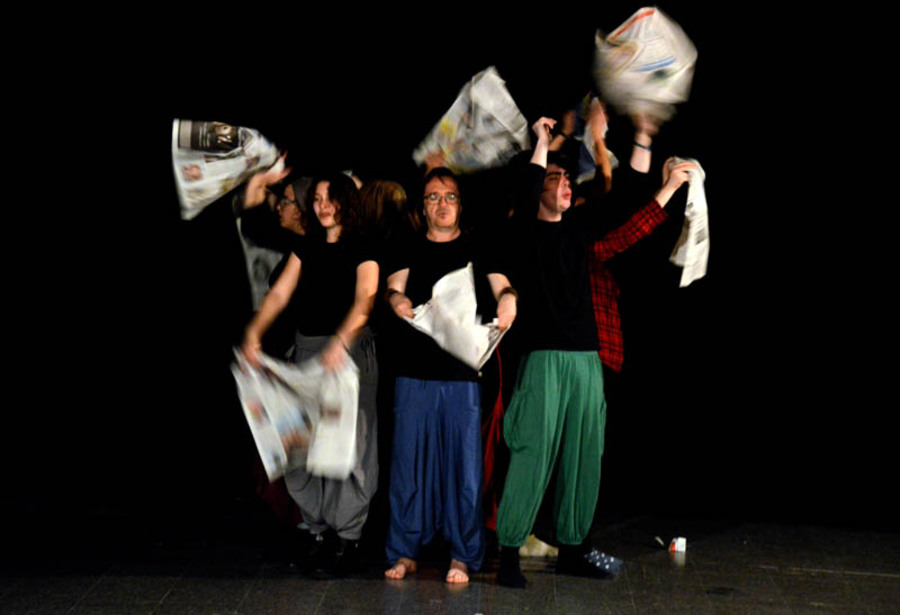Shows
Index / Activities / Shows / The Deluge and the Tree
The Deluge and the Tree
June 24, 20178:00 p.m.
MADRID
Casa Árabe headquarters. Hall of Columns (at Calle Alcalá 62, basement level).
8:00 p.m.
Free entry until capacity is reached.
At its headquarters in Madrid, Casa Árabe is hosting a performance of
the work “The Deluge and the Tree,” organized by Arab-UAM, the Arab
theater group at the Universidad Autónoma of Madrid.
The goal of this performance is to allow the audience to become more familiar with the verses by Palestinian poet Fadwa Tuqan. Through her poem “The Deluge and the Tree,” she highlights the violence committed by Israel in the Palestinian Territories, especially as of 1967, the year when the Six-Day War took place, after which Israel occupied Gaza and the West Bank. This situation, portrayed through Tuqan’s verses, allows us to see a glimmer of hope for existence and re-existence. The tree which grows again out of the bottom depths of the rubble is the symbol representing the Palestinian people’s desire to remain.
In 2017, 100 years will have passed since the signing of the Balfour Declaration, a document which would pave the way for creating a national Jewish homeland, to be materialized as the State of Israel as of 1948, the year known in Arabic as the Nakba: the disaster. These events would give rise to the beginning of what is now referred to as the Palestinian-Israeli conflict, which drags on perpetually with no apparent solution. This year of 2017 also marks the fiftieth anniversary of the Six-Day War, after which Israel achieved the annexation of a large portion of the Palestinian territories, most notably a part of the West Bank and the Golan Heights. At present, Israel’s occupation of these territories continues to cause violence and deprivation in the lives of thousands of Palestinians.
In 2017, 100 years will have passed since the signing of the Balfour Declaration, a document which would pave the way for creating a national Jewish homeland, to be materialized as the State of Israel as of 1948, the year known in Arabic as the Nakba: the disaster. These events would give rise to the beginning of what is now referred to as the Palestinian-Israeli conflict, which drags on perpetually with no apparent solution. This year of 2017 also marks the fiftieth anniversary of the Six-Day War, after which Israel achieved the annexation of a large portion of the Palestinian territories, most notably a part of the West Bank and the Golan Heights. At present, Israel’s occupation of these territories continues to cause violence and deprivation in the lives of thousands of Palestinians.
A Palestinian poet who was born in Nablus in 1917 and died in the same town in 2003, Tuqan is one of the greatest representatives of Palestinian resistance poetry. In fact, she is known as “Palestine’s poetess.” She was awarded with many prizes, including the Jerusalem Culture and Arts Award given by the PLO (1990) and the United Arab Emirates Award (1990).
This group arose as an initiative of the Department of Arab and Islamic Studies at the Universidad Autónoma de Madrid in 2001 and has served as a tool of expression to articulate discourses through the language of the stage arts, and to perfect and put into practice the knowledge of the Arabic language acquired by university students there. In doing so, through these two objectives (expression and learning), they have managed to put together an amateur theater group which makes different Arab authors more visible through theatrical performances.
Team
Fátima Benayad
Olga Blázquez Sánchez
Ruth Morales Cosano
Hayat El Haddadi Bouchachout
Laura Fernández Barraza
Ignacio Gutiérrez de Terán
Nadia Jallad
Nuria Saco Canales
Luis Serrano
Team
Fátima Benayad
Olga Blázquez Sánchez
Ruth Morales Cosano
Hayat El Haddadi Bouchachout
Laura Fernández Barraza
Ignacio Gutiérrez de Terán
Nadia Jallad
Nuria Saco Canales
Luis Serrano
When the hurricane swirled and spread its deluge
of dark evil
onto the good green land
‘they’ gloated. The western skies
reverberated with joyous accounts:
“The Tree has fallen!
The great trunk is smashed! The hurricane leaves no life in the Tree!”
Had the Tree really fallen?
Never! Not with our red streams flowing forever,
not while the wine of our thorn limbs
fed the thirsty roots,
Arab roots alive
tunneling deep, deep, into the land!
When the Tree rises up, the branches
shall flourish green and fresh in the sun
the laughter of the Tree shall leaf
beneath the sun
and birds shall return
Undoubtedly, the birds shall return.
The birds shall return.
of dark evil
onto the good green land
‘they’ gloated. The western skies
reverberated with joyous accounts:
“The Tree has fallen!
The great trunk is smashed! The hurricane leaves no life in the Tree!”
Had the Tree really fallen?
Never! Not with our red streams flowing forever,
not while the wine of our thorn limbs
fed the thirsty roots,
Arab roots alive
tunneling deep, deep, into the land!
When the Tree rises up, the branches
shall flourish green and fresh in the sun
the laughter of the Tree shall leaf
beneath the sun
and birds shall return
Undoubtedly, the birds shall return.
The birds shall return.

